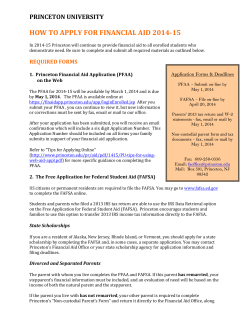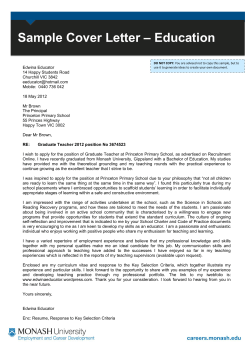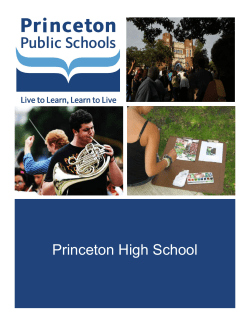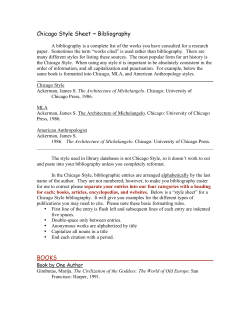
Princeton Undergraduate Financial Aid Information and Application Instructions
Princeton Undergraduate Financial Aid Information and Application Instructions CLASS OF 2018 1 How to Apply for Financial Aid at Princeton P rinceton University has one of the best need-based financial aid programs in the country, reflecting our core value of equality of opportunity and our desire to attract the most talented students. We encourage all qualified students— regardless of financial circumstances— to consider applying for admission to Princeton. If admitted, applicants can be confident that their full financial need will be met. The Princeton Financial Aid Application on the Web To simplify the process of applying for financial aid, Princeton has developed its own aid application on the Web. The Princeton Financial Aid Application (PFAA) offers a number of advantages such as online accessibility, a customized form and fast electronic communication. Furthermore, there is no fee charged for processing the PFAA. We hope the PFAA makes applying for aid at Princeton as easy as possible. How It Works Applicants to the Class of 2018 can register for a log-in account on Princeton’s website (www.princeton.edu, under “Admission & Aid”). Follow links to “Financial Aid for Undergraduate Applicants,” then “Apply for Financial Aid,” and then, “register for a log-in account.” Once you are registered on the secure server you will be able to apply for financial aid. Required Forms and Deadlines Admission Category Princeton Financial Aid Application on the Web* (or paper alternative) Non-custodial Parent’s Form* (if applicable) FAFSA** Early Action Nov. 15 Nov. 15 April 15 Regular Decision Jan. 15 (but no later than Feb. 1) Feb. 1 April 15 Your parents’ 2013 federal income tax return and W-2 statements (or your country’s equivalent if you are not a U.S. citizen) will be required as soon as they are available, but we recommend no later than March 15, 2014. They should be sent directly to Princeton University, not to the CSS IDOC service. Note: The filing deadlines indicated above enable the Financial Aid Office to provide an aid decision at the time admission notifications are mailed. *Available beginning Oct. 1, 2013. **Available after Jan. 1, 2014. When you log in to the PFAA, you will be offered the opportunity to use data you submitted on the College Scholarship Service PROFILE form (if you filed one) as part of your Princeton application. Note that we do not require the PROFILE and will not accept it alone as a complete financial aid application. However, you may find it convenient to include Princeton on the list of recipients if you are completing a PROFILE for another college and wish to incorporate your data in the appropriate sections of the Princeton application. The PFAA accommodates all applicants, including Canadian and other international students. You will be able to save your data and return to the application as many times as you wish before submitting your PFAA to Princeton. After you submit your PFAA, you can continue to view it on the Web, but any new information must be sent by letter, fax or email. We will provide confirmation after we receive your application. Separated or Divorced Parents If your parents are separated or divorced, and the parent you live with 2 has not remarried, you will have one additional requirement to complete your aid application. Both parents are asked to provide their financial information so we can determine their individual contributions for college. You and your custodial parent should complete the PFAA on the Web and the Free Application for Federal Student Aid (FAFSA). For the purpose of confidentiality, your non-custodial parent’s information is submitted separately using Princeton’s Non-custodial Parent’s Form, which is available from this office and on our website in printable format. (However, if your custodial parent has remarried, then your stepparent’s information should be included on all forms, and your non-custodial parent is not required to submit an additional application.) Under exceptional circumstances, the non-custodial parent’s information may be waived at the discretion of the Financial Aid Office. Applicants can receive consideration for a waiver by submitting the Non-custodial Parent Waiver Request, available on our website. Federal Student Aid Programs The information you provide on your PFAA allows Princeton to estimate your eligibility for federal aid programs. We recommend you file the FAFSA by April 15, 2014, to confirm your eligibility. If you are a U.S. citizen or permanent resident and receive an award from P rinceton, you will be required to complete the FAFSA. Income Tax Returns Princeton requires verification of the income information you enter on your application, which is usually estimated at the time of submission. You will be asked for copies of your parents’ 2013 federal income tax return(s) and W-2 (wage and tax) statements when they are available. We strongly recommend that you provide these documents by March 15, 2014. Tax forms and other documents should be faxed to our secure server at 609-258-0336. If you have submitted your PFAA, please include your application number (found in the email acknowledgment) on the fax. You may also mail them directly to Box 591, Princeton, NJ 08542-0591 (Princeton does not use CSS IDOC.), or email them to pfaa@princeton.edu. If you are an early action applicant, or a regular decision applicant whose family’s 2013 tax information is not yet available, please provide the 2012 tax forms. These will suffice until the 2013 documents can be sent. If we receive the tax forms after making an initial offer of aid, your award may be adjusted based on the actual income and tax figures if they differ from the amounts estimated on the PFAA. Your own 2013 tax return may also be required. If you or your parents do not file an income tax return, an alternate source of income verification must be provided. Deadlines E A R LY A C T I O N A P P L I CA N T S : The PFAA will be available on the Web beginning Oct. 1, 2013. We recommend submitting this form by Nov. 15, 2013. If your parents are divorced or separated, and the parent you live with has not remarried, the Non-custodial Parent’s Form or Noncustodial Parent Waiver Request, is also due by Nov. 15. R E G U L A R D E C I S I O N A P P L I CA N T S : We recommend that the same forms described above be submitted by Jan. 15, 2014, but no later than Feb. 1, 2014. A copy of your parents’ 2013 federal income tax return is due March 15, 2014. The FAFSA will be required from students accepting Princeton’s offer of admission and should be filed after your parents complete their income tax return, but no later than April 15, 2014. Tips for Using the Princeton Financial Aid Application on the Web The best way to complete your PFAA on the Web is for both you and a parent to work together on the computer. If this isn’t possible, you can save a partially completed form, then return to finish and submit the application once all of the information needed has been gathered. It is a good idea to prepare in advance by having the following information at hand: • Parents’ estimated 2013 tax information—adjusted gross income, federal income tax, and wage and salary figures • Parents’ estimated 2013 untaxed income—contributions to tax-deferred savings plans, benefits such as Veterans Affairs, housing allowances, and all other sources • Current value of parents’ assets— savings, investments, total value of 529 college savings and/or prepaid tuition plans, real estate equity, business or farm equity, the value of the family home and retirement funds • Student’s taxable and untaxed income for 2013—wages, interest and dividends, and untaxed benefits • Current value of student’s assets— savings, investments, trusts and Uniform Gift to Minors • Family expenses anticipated for 2013—especially school and college costs, unreimbursed medical and dental expenses, education loan payments, and other out-of-the-ordinary expenses. The Financial Aid Office staff is available to help with problems you may encounter while using the PFAA on the Web. You can contact us by calling 609-258-3330, or email questions to pfaa@princeton.edu. 3 Fees and Expenses Fees and expenses for the academic year 2013–14 Tuition. . . . . . . . . . . . . . . . . . . . $40,170 Room charge. . . . . . . . . . . . . . . . 7,220 Board rate. . . . . . . . . . . . . . . . . . 5,860 Estimated miscellaneous expenses (books, supplies, laundry, telephone, recreation, etc.). . . . . 3,500 Estimated total . . . . . . . . . . . . . $56,750 4 T uition includes the matriculation fee and the use of the library, student health services and laboratories. The room charge and board rate are standard for University dormitories and meal plans. Estimated miscellaneous expenses include the residential college fee, activities fee, the one-time transcript fee and class dues. These last four items, totaling about $918, are billed centrally by the University for the convenience of the organizations involved. For students who are not covered under their family’s medical insurance, Princeton offers the Student Health Plan at a cost of $1,900. Because the cost of goods and services continues to rise, charges for 2014–15 are expected to increase modestly. The University bill is the sum of tuition, room, board, residential college fee, class dues, transcript and activities fees. The Student Health Plan charge is also included on the bill for those who participate. Financial aid credits are deducted, and the remaining family payment is due on either a semester or monthly basis. How Princeton’s Student Aid Program Works P rinceton’s aid program is based on four fundamental principles: 1. Admission to Princeton is need-blind for all applicants, including international students. This means applying for financial aid is not in any way a disadvantage in the admission process. Princeton welcomes applications from talented students of diverse economic backgrounds. 2. University aid is awarded solely on the basis of need. There are no merit scholarships. 3. Need is determined through a careful review of each family’s financial circumstances. 4. The full need of every student is met with an award consisting of University grants, scholarships from external sources and a campus job. No student is required to take a loan to pay Princeton’s costs. These principles are discussed under the following headings: “Determining Financial Need” and “Assigning Aid.” Determining Financial Need It is worth repeating that Princeton financial aid is awarded solely on the basis of financial need. No University aid is given based on a student’s talents or achievements. Need is defined as the difference between the student budget and Princeton’s estimate of what the student and his or her family can afford to pay toward these expenses. The parents’ contribution, the student’s summer earnings, a portion of the student’s own savings, and educational benefits are the family resources that are compared with Princeton’s costs to judge whether or not the applicant needs financial assistance. The parents’ contribution Princeton’s unique process of evaluating parental ability to pay for educational costs is based primarily on the information contained in the Princeton Financial Aid Application (PFAA). Each individual aid application is given careful consideration using Princeton’s own methodology, including the exercise of professional judgment for special circumstances. In addition, federal student aid eligibility is determined through the Free Application for Federal Student Aid (FAFSA) and a separate need formula. The main elements we use in determining the parental contribution are family income, assets other than the family home and retirement funds, state and federal taxes, an allowance for family living expenses, and the costs of other family members in college. Once the PFAA information is received, an aid counselor reviews the entire application and determines the expected family contribution. Families can get a preliminary idea of how much financial aid they might receive by using the Princeton Estimator at www.princeton.edu/aid. Separated or divorced parents As described in the section “How to Apply for Financial Aid,” it is Princeton’s policy to request financial information from both parents and to expect each to contribute to educational costs. If the parent you live with has remarried, that parent and stepparent complete the PFAA and FAFSA. No information is required from the noncustodial parent. If the parent you live with has not remarried, then that parent completes the PFAA and FAFSA, and the noncustodial parent completes Princeton’s Non-custodial Parent’s Form. An aid counselor carefully reviews the information from both parents and determines the amount each should be able to contribute toward college costs. Self-supporting students Princeton expects parents to provide financial support according to their ability to pay throughout their children’s college years. Should a student’s parents discontinue their support for other than financial reasons, aid funds will not be available to replace the parents’ contribution. Guidelines for determining if an applicant is self-supporting according to the federal definition are included in the FAFSA. However, for the purpose of awarding its own funds, Princeton requires parental financial information for all students. The student’s own contribution In addition to the amount parents are asked to contribute, students are also expected to help meet a portion of their own educational costs each year. A student’s share comes from summer employment, savings and educational benefits. A typical student entering in September 2013 was asked to contribute $1,530 from summer earnings. The summer contribution is less for low-income and international students. It is expected that this amount will increase for students entering in the fall of 2014. Summer Savings Replacement Aid For students who are unable to meet the summer savings expectation, either because they don’t earn enough or have high job-related expenses, Princeton offers the opportunity to receive replacement aid. This generous aid option allows students greater choice in their summer activities by replacing a savings shortfall with one-half grant and one-half additional job (or loan on request). Students are expected to contribute 5 percent of their assets each year to their education. Student assets are defined as money that is in the student’s name at the time he or she applies for aid. This includes funds that have been placed in a trust or given to the student under the Uniform Gift to Minors Act. Additional sources of student contributions are Veterans Affairs and other educational benefits. Assigning Aid Once we have determined the amount the applicant and his or her parents should be able to pay toward educational fees, we compare this figure to the yearly cost of attending Princeton. If the family contribution is less than the yearly cost, we assign financial aid. We include two types of aid in our awards: scholarships or grants, and jobs. 5 The usual order of assigning assistance is: 1. external scholarships that are awarded to the student (such as National Merit or local community scholarships); 2. a campus job; and 3. Princeton grant funds. External scholarships and grants An important part of Princeton’s aid program is the expectation that students will receive scholarships from nonUniversity sources. These scholarships, when combined with Princeton’s own funds, enable the University to meet the full need of all undergraduates. Applicants who win an outside award are required to notify the Financial Aid Office. As an encouragement to apply for external scholarships, outside aid reduces or eliminates the term and summer job expectations. The Princeton grant is reduced only after these student work requirements have been eliminated. If the Princeton grant is reduced as the result of an outside scholarship adjustment, the lost funds may be recovered and used toward the one-time purchase of a personal computer. This policy of earnings reduction includes employer tuition benefits, but does not apply to the government grants described below. Federal Pell Grants are funded by the government. Aid applicants apply for a Pell Grant (an award that currently ranges from $605 to $5,645) by filing the FAFSA. Pell Grant recipients who are determined to be eligible for an Academic Competitiveness Grant will be notified during the school year and will receive an earnings reduction at that time. Another source of government funds that can be used at Princeton is a state scholarship or grant. Residents of the following states may qualify for an award: Alaska, New Jersey, Rhode Island and Vermont. Students should apply for state aid by completing the FAFSA and, in some cases, a separate state application. Applicants should contact either their high school guidance office or the state grant agency for more information. 6 Campus employment Most students will be offered a termtime job as part of their financial aid award. Princeton has developed an extensive campus employment program to encourage students to work and help pay for some of their college expenses. Part of the funding comes from the Federal Work-Study Program. Students are expected to use their earnings, paid directly to them every two weeks, to meet their book and personal expenses. During their freshman year, students can meet their job earnings expectation if they work an average of 9 hours a week for 30 weeks. Campus jobs are available in the library, dining halls, computing center and various other departments. Freshmen are usually assigned jobs in the library or dining halls. Princeton encourages students to work in community service areas such as social services, transportation, public safety, crime prevention, recreation, youth service and other activities specified in the Community Service Act under the Federal Work-Study Program. More information about these job opportunities is available from the Princeton Student Employment Program, P.O. Box 591, Princeton, NJ 08542, or on the Web at www.princeton. edu/se. Princeton grants The University assigns grant funds from a variety of sources: endowment, general revenues, yearly gifts from alumni and friends, and federal programs. Princeton grants are awarded on the basis of financial need. Some have additional conditions placed on the selection of recipients. Since the Financial Aid Office is responsible for matching students with specific Princeton funds, it is not necessary to file a separate application for University grants. Students from New Jersey, or those who graduate from New Jersey high schools, who are eligible for need-based grant aid from Princeton receive their awards from the William H. Cane Fund. Cane recipients are not required to work (including both term-time and summer employment) and therefore receive a larger portion of grant aid in their award. Federal Supplemental Educational Opportunity Grants (SEOGs) are government funds administered by Princeton and are assigned to students along with University grant funds. Preference in awarding SEOGs is given to students with the lowest expected family contributions. Federal student aid programs Many students receive a portion of their financial aid from federal funds: Work-Study, Supplemental Educational Opportunity Grant or Pell Grant. In addition, Perkins and Stafford loans are available on request. Aside from filing a FAFSA and demonstrating financial need, a recipient of federal aid must also be a U.S. citizen or permanent resident, maintain satisfactory progress toward a degree and be registered (if required) with the Selective Service. Further information about eligibility requirements for federal student aid is available at www.studentaid.ed.gov/ funding. Loans Initial financial aid awards do not include a student loan under our “no-loan” policy, which replaces the loan component with additional grant funds. However, loans from both federal and University sources are available to students on request. Detailed descriptions of these loan programs are available from the aid office and on our website at www. princeton.edu/aid. General Financial Aid Policy P rinceton provides aid to students who make satisfactory progress toward a degree and continue to demonstrate financial need. (The academic regulations section of Princeton’s “Undergraduate Announcement” contains a definition of satisfactory progress.) Students who are required to withdraw for disciplinary reasons will not be eligible for Princeton grant funds in a repeated semester. Campus employment and student loans are the only sources of aid available under those circumstances. The amount and type of aid students receive is reviewed annually. However, adjustments may be made during the year if there are important changes in family resources or student budgets. The most common reasons for award revisions are differences in the information parents provide on the Princeton Financial Aid Application (PFAA) or the Free Application for Federal Student Aid (FAFSA) compared with the income shown on their federal income tax return and W-2 forms, family financial problems such as loss of income or emergency expenses, and a shortfall in student summer savings. Adjustments may be made in a student’s budget for costs that are not adequately covered by the book and personal expense allowance, such as unusual medical expenses. Aid increases to cover higher budgets are usually made with additional job funds, or a loan at the student’s request. Each year students must reapply for financial aid by submitting a current PFAA and FAFSA, and their parents’ most recent federal income tax return, including W-2 statements. Princeton will not consider an aid application for grant funds after the last day of the academic year for which aid is requested. While Princeton is committed to a policy of meeting full need for each year of enrollment, the award received for freshman year is not a guarantee of a specific amount to be received in following years. Aid may go up or down in individual cases depending on changes in a family’s financial circumstances. The most common reasons for significant differences in grant amounts from one year to the next are large increases or decreases in family income, and changes in a sibling’s college enrollment status. Typically, the parental contribution increases as family income rises from one year to the next. If the increase in parental contribution does not keep up with higher University charges, campus earnings and grant assistance are used to meet the additional need. Finally, students can be assured that once they are enrolled, if they demonstrate need in subsequent years, Princeton will continue to provide financial aid. Students who have questions or who would like additional information about financial aid at Princeton should email the Office of Undergraduate Financial Aid at pfaa@princeton.edu. Our mailing address is Box 591, Princeton, NJ 08542-0591; our phone is 609-258-3330; and our fax is 609-258-0336. Confidentiality Policy Since families divulge sensitive financial information to Princeton in the aid application process, we use all available measures to hold this data in strict confidence. Electronic material is protected with current technological safeguards to prevent unauthorized access. Paper records are similarly held in safe storage, and disposed of when necessary in a proper manner such as shredding. There are strict limitations on sharing information with parties other than students and their immediate family members. Organizations outside the University must obtain permission from the student and provide a signed release before receiving aid records. Princeton’s confidentiality policy assures families that their financial aid information will be used only for its intended purpose. Princeton Policy on Honesty and Cooperation in University Matters The following section of Princeton’s “Rights, Rules, Responsibilities” guidelines apply to the expectation of honesty and full disclosure in the financial aid process. 1.1.4 Honesty and Cooperation in University Matters Members of the University community are expected to be honest and straightforward in their official dealings with University processes, activities and personnel. This obligation includes honoring contracts and agreements and providing accurate information on official forms and documents as well as to official University personnel, offices and committees. Deliberate violations of this provision will be considered serious offenses; subsequent violations, or systematic violations in the first instance, will be considered extremely serious. 7 Undergraduate Financial Aid Office 220 West College Box 591 Princeton, NJ 08542-0591 Tel 609-258-3330 Fax 609-258-0336 Email pfaa@princeton.edu Nondiscrimination Statement In compliance with Title IX of the Education Amendments of 1972, Section 504 of the Rehabilitation Act of 1973, Title VI of the Civil Rights Act of 1964, and other federal, state, and local laws, Princeton University does not discriminate on the basis of age, race, color, sex, sexual orientation, gender identity, religion, national or ethnic origin, disability, or veteran status in any phase of its employment process, in any phase of its admission or financial aid programs, or other aspects of its educational programs or activities. The vice provost for institutional equity and diversity is the individual designated by the University to coordinate its efforts to comply with Title IX, Section 504 and other equal opportunity and affirmative action regulations and laws. Questions or concerns regarding Title IX, Section 504 or other aspects of Princeton’s equal opportunity or affirmative action programs should be directed to the Office of the Vice Provost for Institutional Equity and Diversity, Princeton University, 205 Nassau Hall, Princeton, NJ 08544 or 609-258-6110. Publication coordinated by the Office of Communications Photographs: Denise Applewhite, Mahlon Lovett, Brian Wilson Copyright © 2013 by The Trustees of Princeton University In the Nation’s Service and in the Service of All Nations ♻ printed on recycled paper 450065 8
© Copyright 2025










